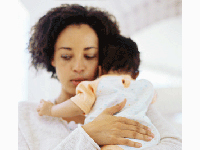Women in U.S. suffer from PPD more than others
Postpartum depression is a form of clinical depression which can affect women, and less frequently men, after childbirth. Studies report prevalence rates among women from 5% to 25%, but methodological differences among the studies make the actual prevalence rate unclear. According to the results of a new survey the situation in U.S. is much more complicated.

An analysis of data from the Pregnancy Risk Assessment Monitoring System (PRAMS) -- an ongoing surveillance project that collects self-reported data on various pregnancy-related issues, showed that one in five women in the United States suffers from postpartum depressive symptoms.
The findings, published in Thursday's Morbidity and Mortality Weekly Report, a publication of the US Centers for Disease Control and Prevention, also indicate that certain groups of women, such as those with lower educational levels, are more prone to postpartum depressive symptoms.
In 2004-2005, the 17 states participating in PRAMS included two questions relating to postpartum depression in their surveys: 1.) "Since your new baby was born, how often have you felt down, depressed, or hopeless?" and 2.) "Since your new baby was born, how often have you had little interest or little pleasure in doing things?"
The women were considered to have postpartum depressive symptoms if they answered "always" or "often," to either question.
Of the states studied, Maine had the lowest prevalence of self-reported postpartum depressive symptoms at 11.7 percent, while New Mexico had the highest at 20.4 percent.
In all of the states, younger age of the new mother, lower educational attainment, and receipt of Medicaid benefits for delivery correlated postpartum depressive symptoms. In 13 of 16 states with available data, non-Hispanic white women were less likely than women of other ethnicities to have postpartum depression.
Five possible risk factors for postpartum depressive symptoms identified in all or most states included tobacco use late in pregnancy, physical abuse before or during pregnancy, partner-related stress during pregnancy, trauma during pregnancy, and financial stress.
Symptoms of PPD can occur anytime in the first year postpartum and include, but are not limited to, the following:
Sadness, hopelessness, low self-esteem, guilt, sleep disturbances, eating disturbances, inability to be comforted, exhaustion, emptiness, inability to enjoy things one previously enjoyed, social withdrawal, low energy, becoming easily frustrated, feeling inadequate in taking care of the baby.
Postpartum depression may lead mothers to be inconsistent with childcare. Women diagnosed with postpartum depression often focus more on the negative events of childcare, resulting in poor coping strategies.
Numerous scientific studies and scholarly journal articles support the notion that postpartum depression is treatable using a variety of methods. If the cause of PPD can be identified, treatment should be aimed at mitigating the root cause of the problem, including increased partner support, additional help with childcare, cognitive therapy, etc.
Women need to be taken seriously when symptoms occur. This is a two-fold practice: first, the postpartum woman will want to trust her intuition about how she is feeling and believe that her symptoms are real enough to tell her significant other, a close friend or her medical practitioner; erring on the side of caution will go a long way in the treatment of PPD. Second, the people in whom she confides must take her symptoms seriously as well, aiding her with treatment and support. Partners, friends and physicians may notice changes in a postpartum mother that she may not. Knowing that PPD is treatable with a variety of methods can make persistence in seeking treatment easier.
Various treatment options include:
Medical evaluation to rule out physiological problems, cognitive behavioral therapy, possible medication, support groups, home visits/visitors, healthy diet, consistent/healthy sleep patterns.
It must be underlined that women with PPD need to be taken seriously. They need love and support, only feeling that they are not alone they may cope with their depression.
Subscribe to Pravda.Ru Telegram channel, Facebook, RSS!





